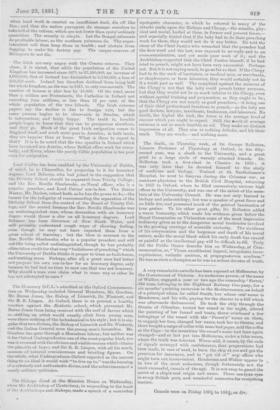The Bishops dined at the Mansion House on Wednesday, when
the Archbishop of Canterbury, in responding to the toast of the Archbishops and. Bishops, made a speech of a somewhat
apologetic character, in which he referred to many of the attacks made upon the Bishops and Clergy,—the missiles, phy- sical and moral, hurled at them in former and present times,— and especially hinted that if the laity had to do their preaching work for them, they would not do it any better. He told the story of the Chief Justice Who remarked that the preacher had the first word and the last, was exposed to no reply and to no cross-examination, and yet made poor work of it ; and the Archbishop suggested that the Chief Justice himself, if he had tried to preach, might not have been very successful. Perhaps not. But it is not saying much, to go as far as that. If the Clergy had to do the work of barristers, or medical man, or merchants, or shopkeepers, or farm labourers, they would certainly not do it a tenth part as well. The ccapplaint against the sermons of the Clergy is not that the laity could preach better sermons, but that they would not be so much inferior to the Clergy, even without special training and preparation, as they Ought to be ; that the Clergy are not nearly as good preachers,—it being one of their chief professional functions to preach,—as the laity are good doctors, lawyers, merchants, tradesmen, and labourers. No doubt, the higher the task, the lower is the average level of success which you ought to expect. Still, the merit of average sermons is not so much humble, as nil. They make no distinct impression at all. They aim at nothing definite, and hit their mark. They are words,—and nothing more.



















 Previous page
Previous page